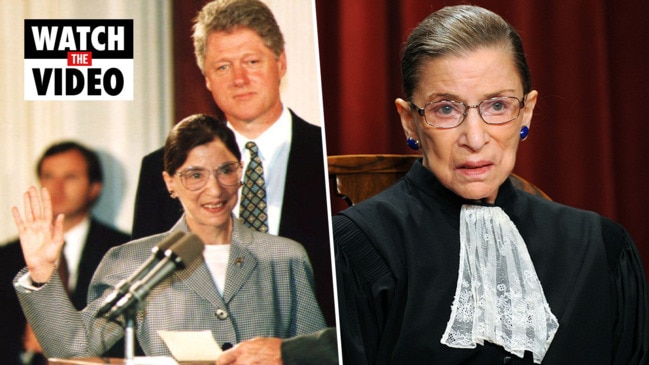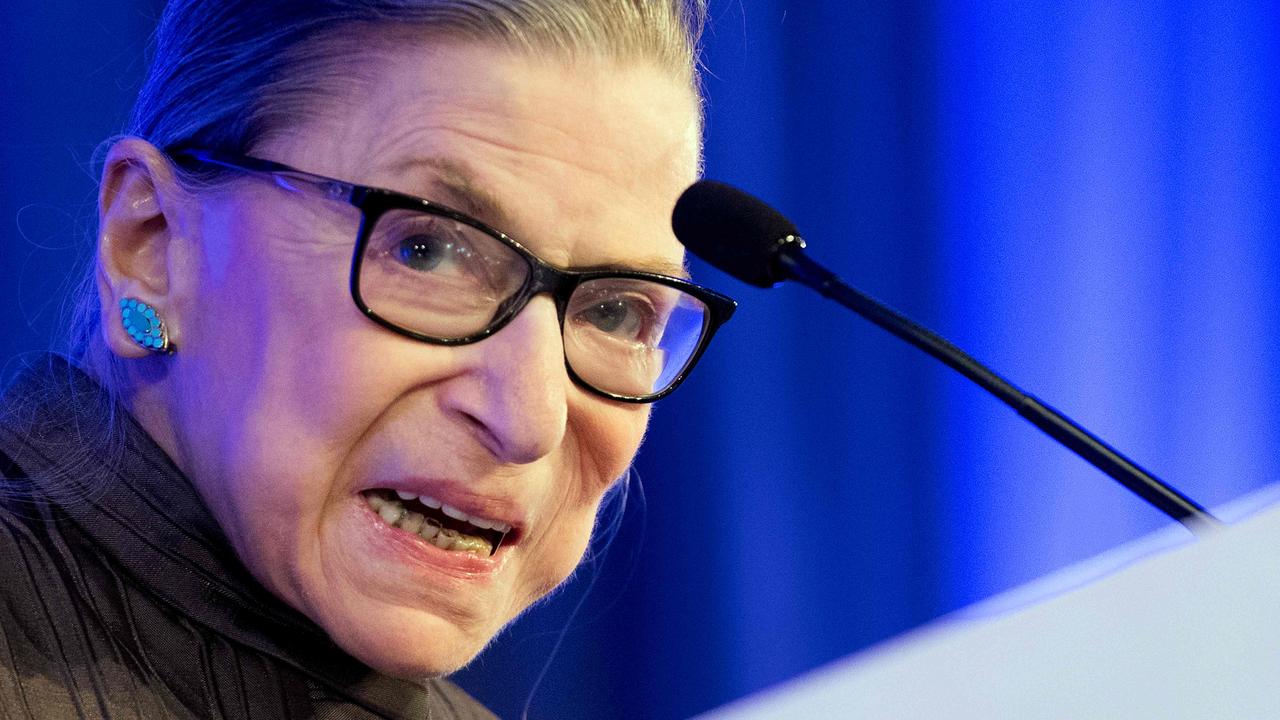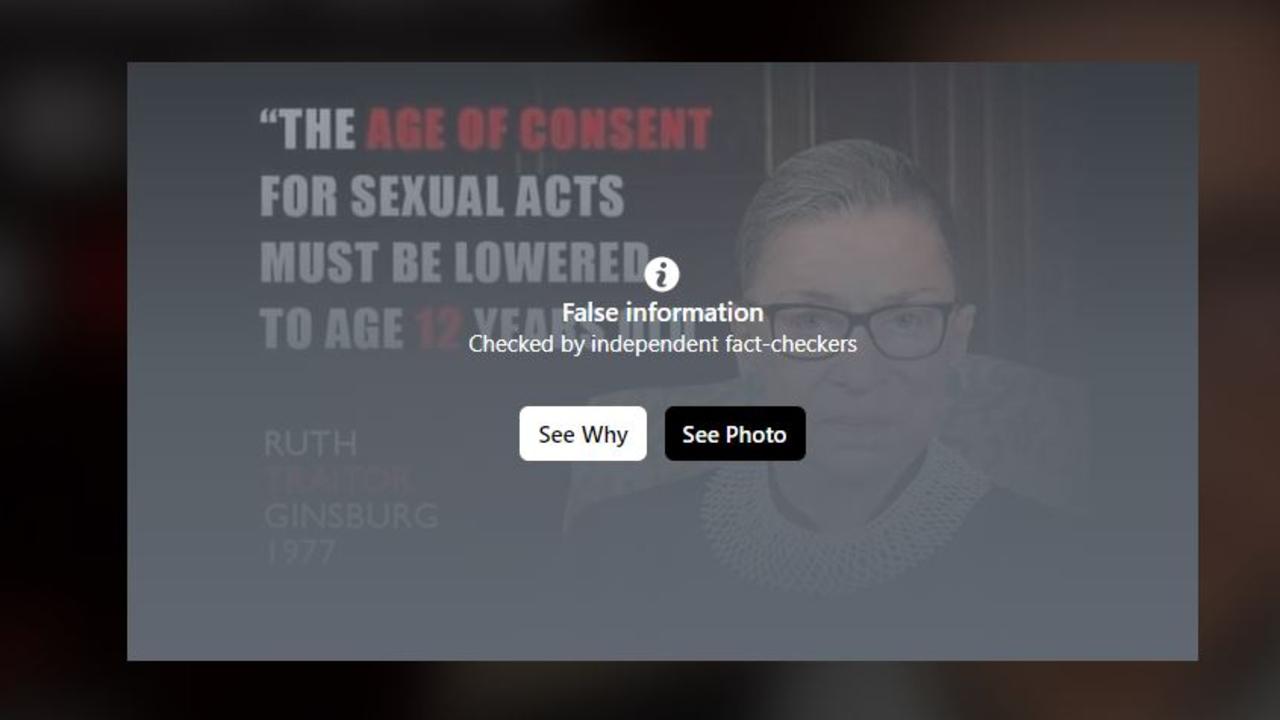Ruth Bader Ginsburg: False rumours spread online about former Supreme Court Justice
She’s been dead just days, but a sick and misleading claim about the Supreme Court Justice has been given new fuel online.

False claims about the late US Supreme Court Justice Ruth Bader Ginsburg have begun doing rounds on social media in an apparent bid to smear her reputation.
Ginsburg, otherwise known as RBG, died on Friday from pancreatic cancer.
She was one of the nine justices of the United States’ highest court that has ruled on some of the country’s most contested and contentious legal issues. She was considered to be from the liberal wing of the bench.
Her death has set up a political battle in the US with President Trump keen to install a new conservative judge despite the election being just weeks away.
RELATED: Trump seeks to replace Supreme Court Justice ‘without delay’

RBG ‘EXTREMELY LIBERAL’
Spurious posts, that have multiplied on social media since her passing, have said that Ms Ginsburg supported lowering the age of consent to just 12 years old and didn’t see a problem with paedophilia.
A quote, purportedly from the late Justice, has appeared on online saying: “The age of consent for sexual acts must be lowered to 12 years of age.”
Facebook has taken to labelling the claim “false information”.
That led one person to respond: “It isn’t false. It is on congressional record.”
But the person then added “She didn’t say it OUT LOUD but it is what she supports.”
Other social media users appeared to have taken the claims as being entirely true.
Certainly, a similar quote did appear on the congressional record, the official record of proceedings in the US Congress, similar to Australia’s Hansard, but it wasn’t from Ginsburg.

In the record dated August 2, 1993, when Ginsburg’s proposed nomination to the Supreme Court was before the Senate, submissions were taken from various parties as to whether she should take on the role which is a lifetime appointment.
One submission, from a lawyer, argued that Ginsburg has proved herself to “extremely liberal” and gave examples which he said provided a “compelling basis for senators to vote against her nomination”.
Among her “extremely liberal” positions, Ginsburg is said to have a “social vision” which is interpreted as ending discrimination based on sexual orientation, allowing women to serve in combat roles and “lowering the age of consent for sexual acts to 12 years”.
Other submissions made similar claims about Ginsburg’s view on the age of consent.

All of the claims appear to stem from a 1977 report co-authored by Ginsburg called Sex Bias In The US Code, published by the US Commission on Civil Rights. The paper did not call for the age of consent to be lowered.
Rather, the document called for gender neutral language to be used in US laws.
At the time, the use of gendered language meant some offences could potentially go unpunished simply due to the gender of the person accused of committing them.
For instance, one US law at the time said: “It is a crime for a person to have carnal knowledge of a female not his wife who has not reached 16 years of age.”
Effectively, that meant only men could commit rape and only women could be victims of the crime.
Ginsburg’s co-authored paper said the definition failed to recognise that men and boys could also be rape victims.
“In the case of statutory rape, the immaturity and vulnerability of young people of both sexes could be protected through appropriately drawn, sex-neutral proscriptions.”

FALSE CLAIM
As an example of how a law could be drafted without referring to gender, the report quoted from a proposed Senate bill from 1973 which didn’t use terms like “male” and “female”.
This is where the consent claims come in.
The wording of the 1973 bill said a person would be guilty of an offence if they forced someone else to take part in sexual act by force or threats, by drugging or intoxicating them, or if “the other person is, in fact, less than 12 years old”.
Ginsburg did not push for the bill to become law, it didn’t become law and the oft-quoted line is not from the late judge.
Several fact-checking sites and legal experts have said that Ginsburg was advocating just for the use of gender-neutral language, not for lowering the age of consent.
Over the years, the passage from the Senate bill has been misinterpreted as Ginsburg herself calling for the lowering of the age of consent.
An even more damning line has been circulating on social media where Ginsburg purportedly said, “Paedophilia is good for the children.”
There appears to be no evidence Ginsburg ever uttered those words.
.@GOP We were put in this position of power and importance to make decisions for the people who so proudly elected us, the most important of which has long been considered to be the selection of United States Supreme Court Justices. We have this obligation, without delay!
— Donald J. Trump (@realDonaldTrump) September 19, 2020
RUSH TO FILL COURT VACANCY
On the weekend, US President Donald Trump confirmed he would seek to replace Ginsburg “without delay”.
“We were put in this position of power and importance to make decisions for the people who so proudly elected us, the most important of which has long been considered to be the selection of United States Supreme Court justices,” the President tweeted.
“We have this obligation, without delay!”
Supreme Court judges are nominated by the President and then scrutinised by the Senate. The Republican Party has a majority in the Senate which potentially means it could ram through an appointment in just the few weeks before the November polling day.
However, when a right-leaning judge passed away in February 2016, nine months before election day, then-president Barack Obama eventually gave in to Republican demands to delay any Supreme Court appointment until after election day.
That allowed Mr Trump to install conservative judge Neil Gorsuch soon after he came to office.
Democrats have accused the Trump administration of hypocrisy for now pushing ahead with a nomination.
Several Republican senators have said they will not support a rushed nomination but the party may still have the numbers to install a new judge heavily swinging the Supreme Court to conservative justices.




